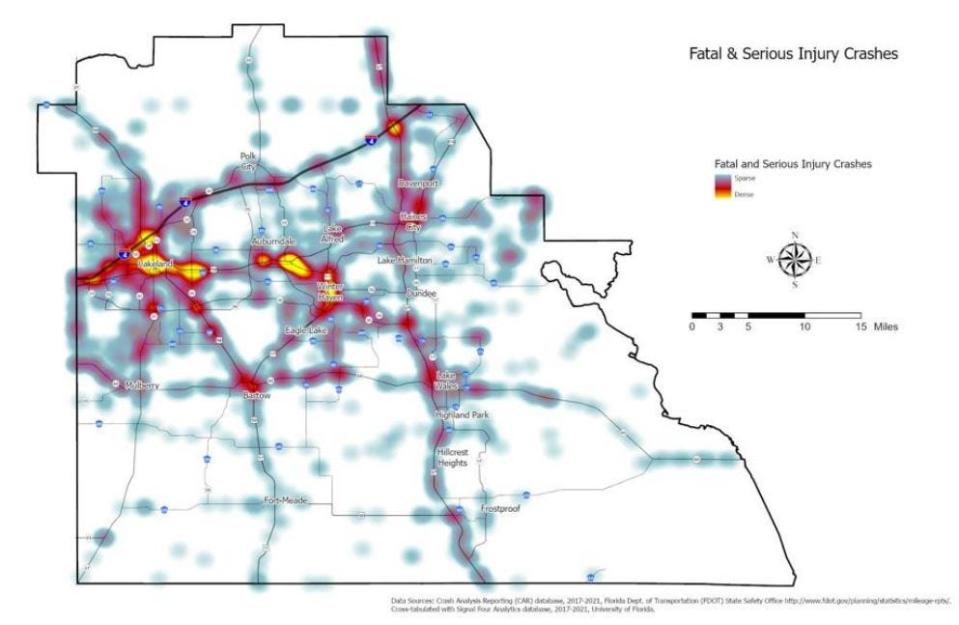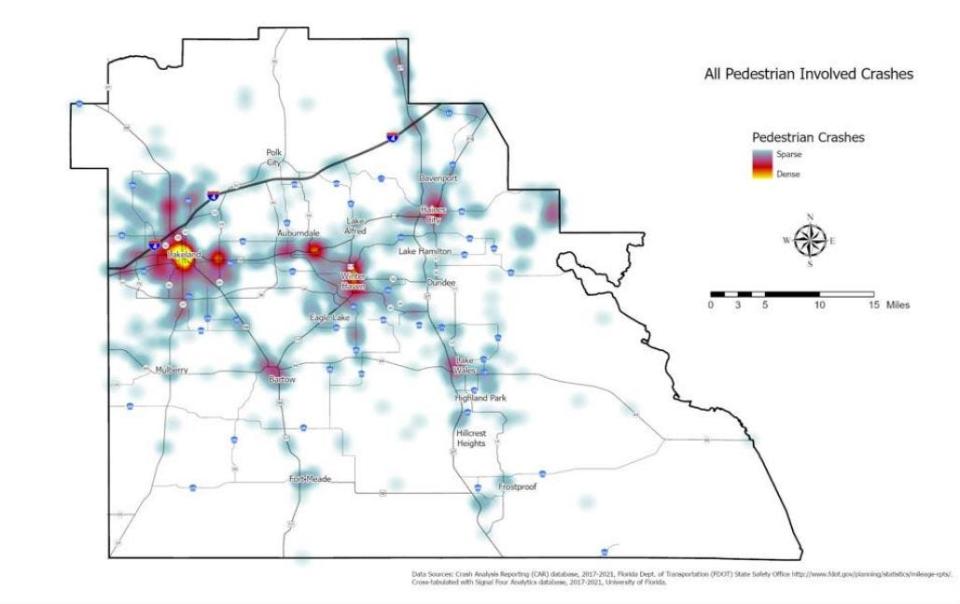'It's abysmal': Polk ranks 9th in US for pedestrian deaths. An effort is underway to fix it
LAKELAND — The Lakeland-Winter metropolitan area ranks No. 9 in the country for the number of pedestrians killed in car crashes in 2021. Polk County and city officials are looking to assemble a plan to lower those numbers.
City officials voted unanimously Monday to support Polk County's request for a $700,000 Safe Streets for All Roads grant application in effort to finish the county's Vision Zero plan.
Vision Zero stands for not a single motor vehicle accident resulting in serious injuries or death.
It will take a lot of work.
Polk County had an average of 127 fatalities a year from 2016 to 2020. There are more than 460 accidents resulting in serious injuries each year, according to Parag Agrawal, the new director of Polk Transportation Planning Organization.
"There's a significant need in Polk County and Central Florida to apply for this grant," he said.
"I have never seen so many accidents in my life as I have in the last six months," Agrawal said, having moved to the area. "I’m sure we can all work together to make sure our communities are safer."
Florida is the most dangerous state for pedestrians, according to the study "Dangerous by Design" completed by the National Safe Streets Coalition and Smart Growth America. The Lakeland-Winter Haven metropolitan area's ranking as ninth worst in the country is an improvement from fifth place in 2019, according to Chuck Barmby, Lakeland's, planning and transportation manager. He said part of that may be because analytical changes in the study's design versus actual roadway improvements.

"It's abysmal," Barmby told officials on Friday. "Take a look at the second worst state, double their numbers and that's where Florida is."
Agrawal said Polk wants to request the federal grant — which requires a 30% local match — to develop an action plan to improve roadway safety. Its aim is to identify the 10 most dangerous corridors and 10 most dangerous intersections. It will develop conceptual level designs to improve these roads with project estimated costs.
The grant's deadline is Sept. 15. The county had no specific timeframe for achieving its goals, but is asking the 17 municipalities to come up with achievable goals and set deadlines to meet them.
"What will it take to get our county, our region out of the bottom ranking?" Commissioner Chad McLeod asked.
Agrawal said several key agencies, including Citrus Connection, Polk Vision and the Central Florida Development Council have agreed and issued letters of support for Polk's grant.
The county plans to apply for subsequent federal implementation grants up to $30 million that are expected to become available through President Joe Biden's 2021 Infrastructure Investment and Jobs Act.
A transportation sales tax?: Traffic and road conditions continue to worsen in Polk County. Is a sales tax increase the fix?
Surgical errors: 'Wrong stitches' case against Lakeland Regional Health reaches settlement
Recreation fees: Lakeland looks to charge youth athletes for field use, increase rental fees for inflation
Lakeland's hotspots
Barmby has started the process of identifying the city's dangerous roadways.
Barmby has mapped all accidents resulting in serious injuries or deaths, including those with bicyclists and pedestrians, from August 2019 to September 2022.
There's a cluster of fatal and serious accidents on East Memorial Boulevard near Lakeland Hills Boulevard/State Road 33. Nearby, there's a smaller cluster of collisions along Memorial Boulevard where its skirts the south edge of Lake Parker.
The Florida Department of Transportation has made efforts to improve Memorial Boulevard's safety with four HAWK pedestrian crosswalk signals in early 2020. These signals went up at Kettles, Vermont, Stella and Morgan avenues.
There are tentative plans to reconstruct Memorial Boulevard, bringing it from six to four lanes, according to Barmby, primarily along the western section of the roadway. The hope is this will improve the safety of the area.
A second hotspot within the city limits is along Ariana Street, from around Harden Boulevard and slightly to the west.

Barmby said he thinks accidents in this area stem from heavy pedestrian foot traffic in the area as people cross from their communities to Harvey's Supermarket and other retail stores.
The central spot for city's pedestrian accidents is downtown Lakeland.
"Central Lakeland is definitely a a bullseye," Barmby said.
It's the mix of the number of cars and pedestrians, which can be particularly dangerous if speed limits are not obeyed. Barmby highlighted studies showing a person hit at 20 mph has a 90% chance of survival. Raise that speed to 40 mph, and the odds of survival drop to 10%.
Agrawal said he thinks speeds, particularly high speeds above posted limits, are a key factor in the region's accidents.
Commissioner Sara Roberts McCarley admitted as a driver she's sometimes guilty of going faster than the posted speed limit.
"We are used to living in an agriculture community where there's big roadways to get from one place to another, so we drive very quickly," she said. "We are not all thinking about other modes of transportation, the other people and their modes of transportation, that we all have to live congruently in one place."
Educating the public
Agrawal told Lakeland commissioners one of the key components to improving roadway safety is helping educate drivers and pedestrians to be aware and to modify their behavior to reduce risks of a serious crash.
The Gulf Coast Safe Street Summit will be held at the RP Funding Center on Nov. 3. This summit will bring together regional leaders and residents to discuss what solutions there are to improving roadway safety for all.
The event will kick off with a series of hands-on demonstrations that people can choose to participate in. The summit will move indoors for the afternoon with key note presentations from Melissa Wandall, president of the National Coalition of Safer Roads, and Polk County Sheriff Grady Judd.
Registration is required to attend, and tickets start at $50. City officials said anyone who wishes to attend and finds the cost a hardship can reach out for assistance. More details on the summit can be found online at www.gulfcoastsafestreetssummit.org.
Sara-Megan Walsh can be reached at swalsh@theledger.com or 863-802-7545. Follow on Twitter @SaraWalshFl.
This article originally appeared on The Ledger: Polk County roads are unsafe. What's being done to fix it?

